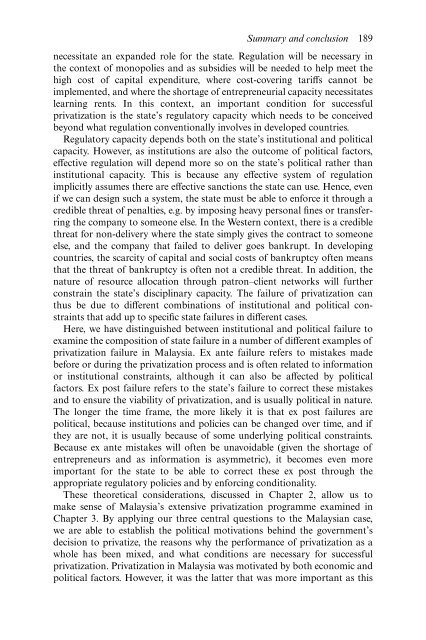PRIVATIZATION Privatization in Malaysia, Regulation, rent-seeking and policy failure
PRIVATIZATION Privatization in Malaysia, Regulation, rent-seeking and policy failure
PRIVATIZATION Privatization in Malaysia, Regulation, rent-seeking and policy failure
You also want an ePaper? Increase the reach of your titles
YUMPU automatically turns print PDFs into web optimized ePapers that Google loves.
Summary <strong>and</strong> conclusion 189necessitate an exp<strong>and</strong>ed role for the state. <strong>Regulation</strong> will be necessary <strong>in</strong>the context of monopolies <strong>and</strong> as subsidies will be needed to help meet thehigh cost of capital expenditure, where cost-cover<strong>in</strong>g tariffs cannot beimplemented, <strong>and</strong> where the shortage of entrepreneurial capacity necessitateslearn<strong>in</strong>g <strong>rent</strong>s. In this context, an important condition for successfulprivatization is the state’s regulatory capacity which needs to be conceivedbeyond what regulation conventionally <strong>in</strong>volves <strong>in</strong> developed countries.Regulatory capacity depends both on the state’s <strong>in</strong>stitutional <strong>and</strong> politicalcapacity. However, as <strong>in</strong>stitutions are also the outcome of political factors,effective regulation will depend more so on the state’s political rather than<strong>in</strong>stitutional capacity. This is because any effective system of regulationimplicitly assumes there are effective sanctions the state can use. Hence, evenif we can design such a system, the state must be able to enforce it through acredible threat of penalties, e.g. by impos<strong>in</strong>g heavy personal f<strong>in</strong>es or transferr<strong>in</strong>gthe company to someone else. In the Western context, there is a crediblethreat for non-delivery where the state simply gives the contract to someoneelse, <strong>and</strong> the company that failed to deliver goes bankrupt. In develop<strong>in</strong>gcountries, the scarcity of capital <strong>and</strong> social costs of bankruptcy often meansthat the threat of bankruptcy is often not a credible threat. In addition, thenature of resource allocation through patron–client networks will furtherconstra<strong>in</strong> the state’s discipl<strong>in</strong>ary capacity. The <strong>failure</strong> of privatization canthus be due to diffe<strong>rent</strong> comb<strong>in</strong>ations of <strong>in</strong>stitutional <strong>and</strong> political constra<strong>in</strong>tsthat add up to specific state <strong>failure</strong>s <strong>in</strong> diffe<strong>rent</strong> cases.Here, we have dist<strong>in</strong>guished between <strong>in</strong>stitutional <strong>and</strong> political <strong>failure</strong> toexam<strong>in</strong>e the composition of state <strong>failure</strong> <strong>in</strong> a number of diffe<strong>rent</strong> examples ofprivatization <strong>failure</strong> <strong>in</strong> <strong>Malaysia</strong>. Ex ante <strong>failure</strong> refers to mistakes madebefore or dur<strong>in</strong>g the privatization process <strong>and</strong> is often related to <strong>in</strong>formationor <strong>in</strong>stitutional constra<strong>in</strong>ts, although it can also be affected by politicalfactors. Ex post <strong>failure</strong> refers to the state’s <strong>failure</strong> to correct these mistakes<strong>and</strong> to ensure the viability of privatization, <strong>and</strong> is usually political <strong>in</strong> nature.The longer the time frame, the more likely it is that ex post <strong>failure</strong>s arepolitical, because <strong>in</strong>stitutions <strong>and</strong> policies can be changed over time, <strong>and</strong> ifthey are not, it is usually because of some underly<strong>in</strong>g political constra<strong>in</strong>ts.Because ex ante mistakes will often be unavoidable (given the shortage ofentrepreneurs <strong>and</strong> as <strong>in</strong>formation is asymmetric), it becomes even moreimportant for the state to be able to correct these ex post through theappropriate regulatory policies <strong>and</strong> by enforc<strong>in</strong>g conditionality.These theoretical considerations, discussed <strong>in</strong> Chapter 2, allow us tomake sense of <strong>Malaysia</strong>’s extensive privatization programme exam<strong>in</strong>ed <strong>in</strong>Chapter 3. By apply<strong>in</strong>g our three central questions to the <strong>Malaysia</strong>n case,we are able to establish the political motivations beh<strong>in</strong>d the government’sdecision to privatize, the reasons why the performance of privatization as awhole has been mixed, <strong>and</strong> what conditions are necessary for successfulprivatization. <strong>Privatization</strong> <strong>in</strong> <strong>Malaysia</strong> was motivated by both economic <strong>and</strong>political factors. However, it was the latter that was more important as this


